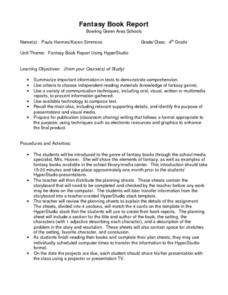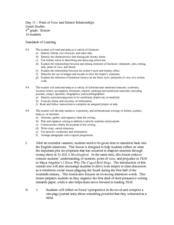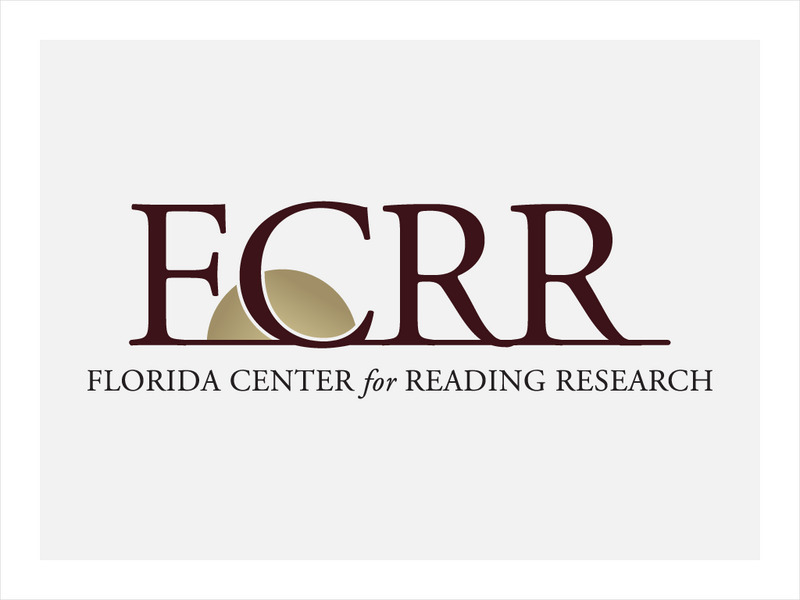Curated OER
Fantasy Book Report
Fourth graders choose a fantasy genre to research and summarize information on in text. They utilize a variety of communication techniques, including oral, visual as well as written/multimedia reports and then present information...
Curated OER
Picture the Process!
Learners read "Chasing Vermeer," and then study the author's writing process. They make connections between the book and the author's real life experiences. They then write an original mystery story, following the writing process.
Curated OER
Unnatural Selection
Students identify quotation marks and demonstrate the uses of quotation marks. They rewrite sentences without quotation marks and discuss how the meanings can change without the use of quotation marks. In addition, they make their own...
Curated OER
Movie Cloze
In this movie worksheet, students fill in the blanks to sentences with movie vocabulary. Students fill in the blanks for 24 sentences about movies.
Curated OER
Rollin' Down the River
Students examine the contributions of Lewis and Clark. In this Louisiana Purchase lesson, students research Internet and print sources regarding the Lewis and Clark expedition.
Curated OER
Point of View and Mentor Relationships
Tenth graders analyze the role of mentors, point of view, and prejudice using the texts of To Kill a Mockingbird and Maya Angelou's I Know Why the Caged Bird Sings. For this literature analysis lesson, 10th graders review Scout's...
Curated OER
Exploring Prejudice and Text-to-Text Relationships
Tenth graders use the novel To Kill a Mockingbird to analyze relationships in society. In this literature analysis lesson, 10th graders participate in a shoe activity where they bring in one shoe belonging to someone they know and a...
Curated OER
Identifying and Describing Story Elements
First graders examine how to identify the different elements of a story and how they fit in a definite sequence. The use of comprehension skills is essential to retell the story as desired within the instructional activity.
Curated OER
Inter / Intra Personal Lesson Plan
Middle schoolers identify the causes of the American Civil War. Using the internet and print sources, they read about the causes and personal backgrounds of those who participated in the war. They choose a character from the time...
Curated OER
Rock Art
First graders create and share their own rock art based on Navajo and Hawaiian rock art.
Curated OER
Property: Ownership, Respect, and Responsibilty
Learners brainstorm objects that belong to themselves, classmates, the teacher, and the school. They discuss and rank what happens when personal property is damaged.
Curated OER
Growing Pains of the Yearling
Fourth graders read The Yearling by Marjorie Kinnan Rawlings.
Curated OER
Painters as Authors
Second graders explore artists as authors. They discuss the stories that their pictures tell. Students describe what story they think the artist is trying to tell in their pictures. Students search the Internet and choose a piece of...
Curated OER
Avoiding Primer Language
In this avoiding primer language worksheet, students combine four or five simple sentences into one effective sentence with only one independent clause.
Curated OER
Conflict
Middle schoolers outline the action in their narrative writing assignments by brainstorming about conflict. In this conflict analysis lesson, students define conflict and discuss the different types of conflict. Middle schoolers...
Pennsylvania Department of Education
What's My Sound?
Students follow a power point presentation to practice the sounds each letter of the alphabet make. In this 'what's my sound' activity, students apply word recognition strategies and demonstrate listening and comprehension skills to...
PBS
Pbs: The American Novel: Literary Timeline: Novels: 1850: The Scarlet Letter
Brief Introduction to Nathaniel Hawthorne's The Scarlet Letter. Highlights the novel's themes, setting, and main characters.
PBS
Pbs: The American Novel: Literary Timeline: Novels: 1852: Uncle Tom's Cabin
Brief introduction to Uncle Tom's Cabin, highlighting the novel's important themes, setting, and main characters.
PBS
Pbs: The American Novel: Literary Timeline: Novels: 1826: Last of the Mohicans
Brief introduction to The Last of the Mohicans by James Fenimore Cooper, highlighting the novel's themes, setting, and main characters.
Florida Center for Reading Research
Florida Center for Reading Research: Narr. Text Structure: Picture the Character
A lesson plan in which students read a narrative text and complete a graphic organizer to illustrate and write characteristics of one of the characters. Materials are included.
Read Works
Read Works: Grade 1: Three Lesson Unit: Character: Actions, Feelings, Looks
[Free Registration/Login Required] A series of three lesson plans, based on David Shannon's books No, David!, David Gets in Trouble, and David Goes to School. Students learn how to utilize text and picture clues to determine and describe...
Alabama Learning Exchange
Alex: "Hot Dog" Book Reports
Learners will use a Makes Sense Strategies Think-sheet to learn to identify the characters, setting, main idea and details of a book read. [Requires Adobe Reader.]
Texas Education Agency
Texas Gateway: Compare/contrast Themes and Genres in Literary Texts
Determining the theme is not easy; you have to use the clues the author leaves to figure it out yourself. The author implies information about the story through plot points, setting, and characters. You infer and draw conclusions based...
Better Lesson
Better Lesson: Day 1 Rude Giants
Students will use illustrations and details in a story to describe its characters, setting, and events by working with partners to ask and answer questions about the text.

























